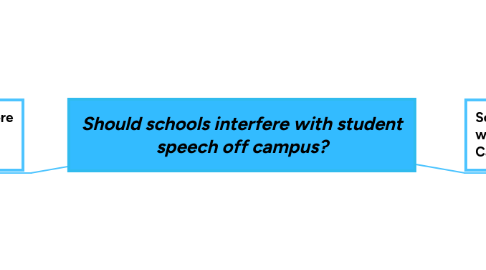
1. Schools Can Rightfully Interfere with Student Speech off Campus
1.1. Schools have rules that students should have to obey (Roberts).
1.1.1. John Robert, chief justice of the US Supreme Court states, "At a school-sanctioned and school-supervised event, a high school principal saw some of her students unfurl a large banner conveying a message she reasonably regarded as promoting illegal drug use..." (Robert).
1.1.1.1. All of it happened on school property and it was against school rules; therefore, it shouldn't have been allowed.
1.1.2. Chief Roberts reports "The drug abuse problem among our nation's youth has hardly abated since Vernonia was decided in 1995. In fact, evidence suggests that it has only grown worse." (Roberts).
1.1.2.1. The drug abuse problem for children in our country has only increased so it only makes sense for the schools to interfere with that.
1.1.3. Because people might say things that harm other students or something that might violate the rules of the school.
1.2. High schools don’t violate student’s rights to freedom of speech by restricting them from harming other students (Reinhardt)
1.2.1. Because students should be restricted from harming others at any cost.
1.2.2. In the article "District's Discipline Over Drug Banner Violated Student's Rights, Court Says" U.S. Circuit Judge Andrew J. Kleinfeld says "The case falls squarely under the U.S. Supreme Court's 1969 decision in Tinker v. Des Moines Independent Community School District..." It upheld students' right to wear black armbands to protest the Vietnam War as long as school was not substantially disrupted. (Reinhardt)
1.2.2.1. The students who were protesting the Vietnam War with their black arm bands were not harming anybody in any way, therefore they shouldn't have been punished for their actions.
1.2.3. Judge Kleinfeld responded to the school's case, which said that Joseph Fredrick's words at a pep rally were meant to sound like sexual innuendos by stating that "Joseph Frederick's speech was not vulgar, lewd, and obscene and did not cause the crowd's disruptive behavior." (Reinhardt)
1.2.3.1. Kleinfeld thinks that Joseph Fredrick's words didn't harm anybody so he shouldn't have been punished for making a joke.
2. Schools Should Not Interfere with Student Speech off Campus
2.1. Students have the right to freedom of speech (Silverman).
2.1.1. Justin Silverman, a law student at Suffolk University Law School says, "High school students were suspended for creating fake MySpace profiles on which they insulted their principals." In Layshock v. Hermitage School District, the court found that school officials should not have suspended a student who described his principal in rude and sexual ways (Silverman).
2.1.1.1. The student called her names but they have the right to do that. They didn’t threaten or physically harm anyone in any way.
2.1.2. Silverman, an intern at the Citizen Media Law Project explains, "A freshman at Oak Grove High School in Missouri used Facebook last month to vent about another student: 'Wow, [expletive] alert,' wrote Megan Wisemore. 'You're a skank and I hate you with a [expletive] passion.' Though Wisemore intended only for her friends to see the message, the classmate she wrote about eventually read the posting as well." (Silverman).
2.1.2.1. She said the things in what she thought was a safe space with her friends so she said what she was feeling in a very raw way. She didn't take their feelings into account because she didn't think she needed to.
2.1.3. Because students should rightfully be able to say what they are feeling without being expelled for it.
2.2. Authority should not control individuals' display of personal opinion (Trotter).
2.2.1. Because students have the right to express their opinion in any way that doesn't harm anybody in the process.
2.2.2. U.S. Circuit Judge Andrew J. Kleinfeld said, "The case falls squarely under the U.S. Supreme Court's 1969 decision in Tinker v. Des Moines Independent Community School District..." The case being a principal taking away a student's pro-drug banner while he was on the school campus (Trotter).
2.2.2.1. The court case they refer to is about students being punished for wearing black bands around their arms to show they were against the Vietnam war. They were both just trying to show what they support and both in a non-violent way that they should have been safe expressing.
2.2.3. Judge Kleinfeld said, "Mr. Frederick's speech was not "vulgar, lewd, and obscene" and did not cause the crowd's disruptive behavior." (Trotter).
2.2.3.1. His words had no negative outcomes, nor did they undermine the school’s educational mission.

